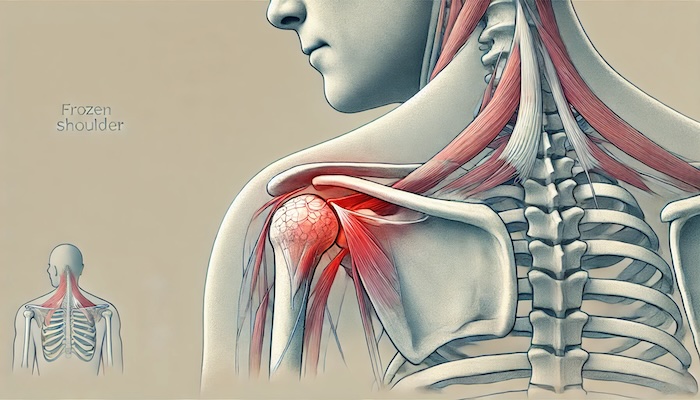
Frozen shoulder, or adhesive capsulitis, is characterized by pain and significant stiffness in the shoulder joint, limiting its range of motion. This condition typically progresses through three phases: the freezing stage (painful phase), the frozen stage (stiffness phase), and the thawing stage (recovery phase). Each stage can last several months to years if untreated.
Causes and Risk Factors
A frozen shoulder often develops when the shoulder remains immobile for extended periods due to injury, surgery, or other medical conditions. Risk factors include:
- Age and Gender: It is more common in individuals aged 40–60, particularly women.
- Medical Conditions: Diabetes, thyroid disorders, and cardiovascular diseases can increase susceptibility.
- Injury or Surgery: Prolonged immobilization can trigger the condition after a shoulder injury or surgery.
Symptoms
Frozen shoulder manifests as:
- Persistent pain, especially at night.
- Reduced range of motion.
- Difficulty with daily tasks like reaching overhead or behind the back.
Interventional Pain Management Techniques
At Precision Pain Care and Rehabilitation, advanced interventional pain management options are available to alleviate symptoms and promote recovery:
- Physical Therapy: Customized exercises improve flexibility and restore motion.
- Corticosteroid Injections: These reduce inflammation and alleviate pain.
- Hydro-dilatation: A minimally invasive procedure that involves injecting a sterile solution to stretch the joint capsule.
- Nerve Blocks: Effective for managing severe pain by targeting specific nerve pathways.
- Home Care Guidance: Including heat/ice application, gentle stretching, and posture correction.
Data and Outcomes
Research indicates that early intervention significantly improves recovery outcomes. Patients treated with a combination of physical therapy and interventional techniques report improved function and reduced recovery time.
Prevention Tips
To prevent a frozen shoulder:
- Maintain mobility after injuries or surgeries through guided exercises.
- Engage in regular shoulder stretches, especially if your job involves repetitive movements or prolonged inactivity.
For patients with frozen shoulders, Precision Pain Care and Rehabilitation offers comprehensive care tailored to individual needs, emphasizing minimally invasive techniques for effective pain relief and recovery.
Let me know if you’d like additional details or a customized consultation plan!
Precision Pain Care and Rehabilitation has two convenient locations in Richmond Hill – Queens, and New Hyde Park – Long Island. Call the Queens office at (718) 215-1888 or (516) 419-4480 for the Long Island office to arrange an appointment with our Interventional Pain Management Specialists, Dr. Jeffrey Chacko or Dr. Sonny Ahluwalia.













